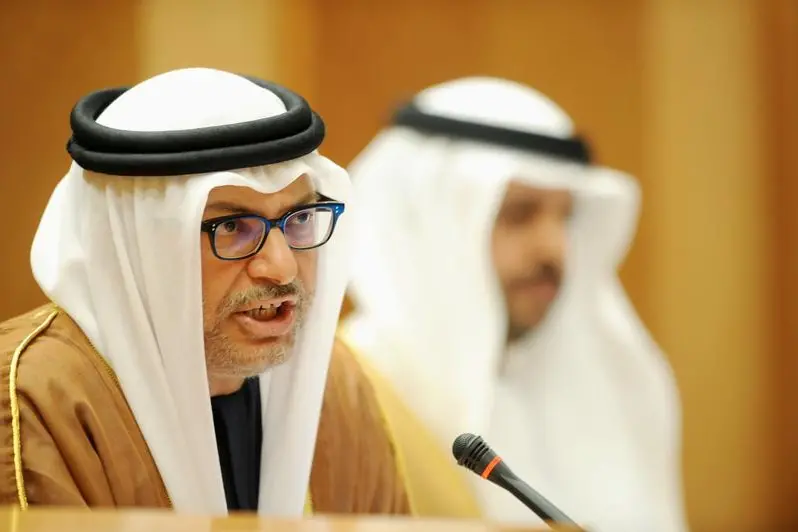PHOTO
By Tom Finn and John Irish
DOHA/PARIS, June 19 (Reuters) - The United Arab Emirates warned Qatar on Monday that sanctions imposed by several of its neighbours could last for years unless Doha accepts demands which Arab powers plan to reveal in coming days.
Qatar, which denies accusations by its neighbours that it funds terrorism and foments regional instability, held wargames with Turkish troops, showing off one of its few remaining strong alliances after two weeks of unprecedented isolation.
The Gulf diplomatic dispute has opened a rift between some of the main U.S. allies in the Middle East, after Saudi Arabia, Egypt, the UAE and Bahrain cut off tiny-but-wealthy Qatar from trade, travel and diplomacy two weeks ago.
Tough remarks by UAE Minister of State for Foreign Affairs Anwar Gargash on Monday made clear that the countries seeking to isolate Qatar have no intention of backing down soon.
"Qatar will realise that this is a new state of affairs and isolation can last years," Gargash told a small group of reporters in Paris on Monday.
"If they want to be isolated because of their perverted view of what their political role is, then let them be isolated. They are still in a phase of denial and anger," he said, adding that a list of grievances for Qatar to address would be completed in the next days.
Qatar has relished support from Turkey during the dispute. Its state-funded pan-Arab news channel Al Jazeera showed footage of a column of armoured personnel carriers flying the Turkish flag inside the Tariq bin Ziyad military base in Doha.
It reported that additional Turkish troops had arrived in Qatar on Sunday for the exercises, although military sources in the region told Reuters the operation actually involved Turkish troops that were already present rather than new arrivals.
The dispute is a major test for the United States, which is close allies with the countries on both sides. A base in Qatar houses the headquarters of U.S. air power in the Middle East.
President Donald Trump strongly supported the sanctions against Qatar, even as his State Department and Defense Department tried to remain neutral. Trump called Qatar a "funder of terrorism at a very high level", but five days later his Pentagon approved selling $12 billion of warplanes to Qatar.
"BASELESS PROPAGANDA"
Qatar, the world's richest country per capita, has used its wealth over the past decade to exert outsized influence in the Middle East, backing factions in civil wars and revolts across the region.
It says it is being punished for straying from its neighbours' political line of backing the region's authoritarian hereditary and military rulers.
"It is unfortunate that our neighbours have chosen to invest their time and resources in a baseless propaganda campaign," Sheikh Saif Bin Ahmed al-Thani, Director of Qatar's Government Communications Office, said in a statement on Monday, calling the terrorism accusations a "publicity stunt".
The Qatar Financial Centre which provides special rules for foreign-owned companies operating in Qatar, said on Monday it has no plans to take any action against Saudi Arabian, Emirati or Bahraini firms in response to their governments' sanctions against Doha. "It remains business as usual, and we intend to keep it that way," its CEO Yousef al-Jaida said.
Turkey is one of the few powerful countries in the region willing to show its support for Qatar openly. Two days after the sanctions were imposed, its parliament fast-tracked legislation to allow more troops to be deployed to a military base in Qatar that already houses about 90 Turkish soldiers under an agreement signed in 2014.
Turkey has said it will deploy 3,000 ground troops at the base, primarily to serve as a venue for joint exercises.
Qatar has only 300,000 citizens enjoying the wealth produced by the world's largest exports of liquefied natural gas. The rest of its 2.7 million people are foreign migrant workers, mostly manual labourers employed on vast construction projects that have crowned the tiny desert peninsula with skyscrapers as well as stadiums for the 2022 soccer world cup.
The sanctions have disrupted its main routes to import goods by land from Saudi Arabia and by sea from big container ships docked in the United Arab Emirates. But it so far has avoided economic collapse by quickly finding alternative routes.
Qatar says the sanctions have also brought personal hardship for its citizens who live in neighbouring countries or have relatives there. The countries that imposed the sanctions gave Qataris two weeks to leave, which expired on Monday.
Thousands of Qataris have been unable to board flights to the UAE, Saudi Arabia and Bahrain, and cut off from relatives in those countries, in a region where cross-border marriages are common and rulers refer to each other as "brothers".
The Qatari government communications director, Sheikh Saif, said Saudi, Emirati, and Bahraini families had been "forcibly recalled" on Monday by their governments despite being invited to stay by Qatar.
(Editing by Sami Aboudi and Peter Graff) ((tom.finn@tr.com))
Keywords: GULF QATAR/





















